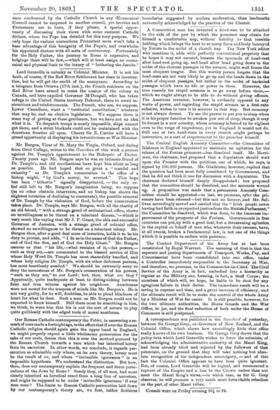Mr. Burgon, Vicar of St. Mary the Virgin, Oxford, and
dating from Oriel College, writes to the Guardian of this week a protest against Dr. Temple's appointment to the Bishopric of Exeter. Twenty years ago Mr. Burgon says he was an intimate friend of Dr. Temple's, and old recollections have kept him silent as long as possible. He had hoped that so great a "scandal and calamity" as Dr. Temple's consecration to the office of a bishop might, "by God's mercy, be averted." This hope has been " hitherto " signally disappointed, — the only re- lief still left to Mr. Burgon's imagination being, we suppose (as no other obstacle intervenes, and no bishop has shown the slightest intention of declining to consecrate), the passible removal -of Dr. Temple by the visitation of God, before the consecration takers place. Dr. Temple, says Mr. Burgon, with all the charity of an old friend, "with a strange greed of ecclesiastical office, shows no unwillingness to be thrust on a reluctant diocese,"—which is very much like saying that Sir .1. P. Grant, the able and successful Governor of Jamaica, with a strange greed of colonial office, showed no unwillingness to be thrust on a reluctant colony. Mr. Burgon then, after a good deal more of invective, holds it to be his duty to protest, and adds, "I do so in the name of God the Father, and of God the Son, and of God the Holy Ghost." Mr. Burgon assures us that "his life,--what remains of it,—his powers,— such as they are,—are consecrated to the blessed service of Him whose Holy Word Dr. Temple has most shamefully handled, and whose holy religion Dr. Temple, with six other dishonest persons, has most heartlessly assailed." We should be extremely sorry to deny the earnestness of Mr. Burgon's consecration of his powers, " such as they are," to our Lord ; but, then, what are they ? Apparently, quite inadequate at least to distinguishing between false and true witness against his neighbour. Anathemas were not meant for the weapons of minds like Mr. Burgon's. He is not very guilty, for he will, doubtless, be able to plead blindness of heart for what he does. Such a man as Mr. Burgon could not be expected to know himself. Still there must be something in him, we think, to warn him that his is not the sort of nature to play quite guiltlessly with the edged tools of moral anathema.


































 Previous page
Previous page